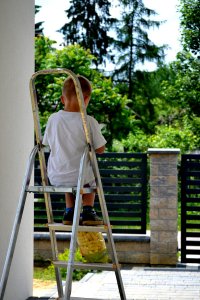
Building Confidence and Independence
Learning to change a fuse, unblock a drain, or fix a wobbly chair leg does far more than solve immediate problems. These skills build genuine confidence that comes from knowing you can handle life’s practical challenges. If you are fostering in Bristol, the children living with you may have experienced instability, mastering these skills can provide a profound sense of control over their environment.
When children successfully complete maintenance tasks, they develop what psychologists call ‘self-efficacy’ - the belief in their ability to influence events affecting their lives. This confidence transfers to other areas, from academic work to social relationships.
Essential Financial Benefits
Home maintenance skills translate directly into financial independence. A young adult who can fix a dripping tap, repair a squeaky door, or tackle basic decorating will save hundreds of pounds annually in call-out fees and labour costs.
Consider the typical charges for simple jobs: £80 for a plumber to change a washer, £50 for someone to hang a few pictures, etc. These seemingly minor expenses accumulate rapidly, particularly for young people starting out in rented accommodation on limited budgets.
Practical Skills to Prioritise
Start with safety-first basics: how to turn off water, gas, and electricity in emergencies. Then progress to simple tasks like changing light bulbs, bleeding radiators, and using basic tools safely.
Older children can learn to fix squeaky hinges, replace toilet seats, touch up paint scratches, and assemble flat-pack furniture. These skills might seem mundane, but they’re precisely the challenges young adults face when leaving care or the family home.
For foster carers, these activities provide excellent opportunities for positive, non-threatening interaction whilst building practical capabilities that children can take pride in developing.
Problem-Solving and Resilience
Home maintenance teaches systematic problem-solving. Children learn to diagnose issues, research solutions, gather appropriate tools, and work methodically towards resolution. When something doesn’t work the first time, they learn persistence and adaptability.
This process builds resilience - arguably one of the most crucial life skills. Children discover that most problems have solutions, and that with patience and the right approach, they can overcome challenges independently.
Creating Teaching Opportunities
Start small and age-appropriate. A five-year-old can help sort screws by size whilst you work. An eight-year-old can hold the torch and pass tools. Teenagers can take the lead on projects whilst you supervise and guide.
Make it enjoyable rather than a chore. Celebrate successes, however small, and treat mistakes as learning opportunities. Document the progress with photos - children love seeing their developing capabilities.
The Long-Term Investment
Teaching home maintenance skills requires patience and time initially, but it creates independent, capable adults. For foster carers, these skills become part of a young person’s toolkit for successful independent living. For parents, it’s an investment in their child’s future wellbeing and financial security.
In our throwaway culture, children who can fix, maintain, and care for their possessions develop different relationships with their environment - more thoughtful, more sustainable, and ultimately more satisfying.
Newer Articles
- How to Help Your Child Develop a Growth Mindset
- How Does a Trading Model Work for a Prop Firm?
- Wood and Design: How Wood Shapes Modern Interiors

